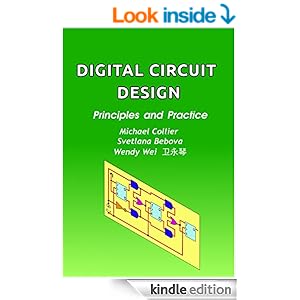Dead: Free Kindle Book- Digital Circuit Design: Principles and Practice (was $14.40)
 tonyp12
Posts: 1,951
tonyp12
Posts: 1,951

basically a sophomore level digital design class, with a little less depth and a little more breadth
LINK: http://www.amazon.com/dp/B00LFS3A0I


Comments
And nobody use BCD decoders anymore, but the stuff it teaches is good to know.
PM your email address and I lend it to you for 14days (yes kindle system let me do that, one person at a time)
I recall seeing the circuit of the J-K Flip flop using NOR gates in that book for the first time ever, wow it was inspirational, it's burned into my retina still.
I like to think there is a place in the world for such basic books for kids sill today. Perhaps this is one.
Best digital book I started with was in 197xxx and that was Don Lancaster's "TTL Cookbook". That and Comer's "Digital Logic and State Machine Design". As to mapping, used it "a while back" for EPLDs. Not useful FPGA or other programmable devices?
Prime membership does have some good bennies
My high school introduction to digital electronics was a step by step work book that covered the same basic material. Cannot recall the exact title but it was something along the lines of "A Programmed Text for Digital Electronics". It was an excellent introduction, and imo the fundamental knowledge I got from it was priceless. Everyone involved in computers and electronics would benefit from understanding it at such a fundamental level.
I still have the copy of the TTL Cookbook I bought many decades ago! I read through that over and over and over again!
Although they do not show up on the RS web search, I still find them available at the stores.
(I think I have them all from the 80's)
When Kat wanted to learn some electronics, we scored some good Ebay deals on the RadioShack Electronics Learning Lab, SensorsLab, and 300 in One Electronic Project Lab kits.
So we have the 3 included books by Forrest Mims:
"Basic Electronics" (transistors and integrated circuits) Workbook I
"Digital Logic Projects" Workbook II
"Electronic SensorsLab"
We've done a few of the projects with the kits like blinking LEDs and made a working Volt Meter, but have a long way to go to get through them all (especially with the Parallax Activity Bot now taking precedence). Are most of the things in those Forrest Mims books still pretty relevant today? Looks like 2000 - 2001 on the copyrights. Or have things sailed on in the past 15 years since they were printed and we should get something more updated?
copyright 2000 to old? Nah, not for these. They're fairly basic. I have a couple and the info is still very useful. Learn from them and build from there. Stuff changes and new stuff emerges that won't be in them, but the basics don't change much if at all.
-Tor
In a search for that question I discovered the Quine-McCluskey algorithm: http://en.wikipedia.org/wiki/Quine%E2%80%93McCluskey_algorithm
There are free implementations of it in various languages and you can try it out here: http://booleanbot.com/
Jack Crenshaw discusses it here: http://www.embedded.com/electronics-blogs/programmer-s-toolbox/4025004/All-about-Quine-McClusky
So this is great, this free book has indirectly taught me something entirely new. And I haven't had my morning coffee yet !
Twitter, smartphones, GPS, etc.
Note - "Mims" has two "m"s in it, not threee!
Nice that you found that (thanks for the links!) but that too is a very old method. My point was that almost no one has a need to minimize logical expressions these days as most designers just use a micro or programmable gate array of some type and the problem becomes one of programming and/or compiler optimization of a complex expression. In theory the people that design micros might still need to do this, but I'm sure that their tools do this for them. (I guess there might be a need for this in some super time critical processing too.)
Still the idea of logical expression minimization is important and should be covered in a modern basic digital design course, but having students spend a lot of time with Karnaugh maps (or Quine-McCluskey tables) would be pointless.
Darn tablet.
wass,
Now you got me. What's a more recent method than Quine-McCluskey? I might need it if I ever get around to building that CPU out of relays/transistors that I sometimes day dream about.
I guess you are right, I would hope my FPGA tools are minimizing things for me as best they can (They certainly take long enough about it
Probably nothing. I was just pointing out that both Karnaugh Maps and the Quine-McCluskey method date back to the same time period, the mid 1950's.